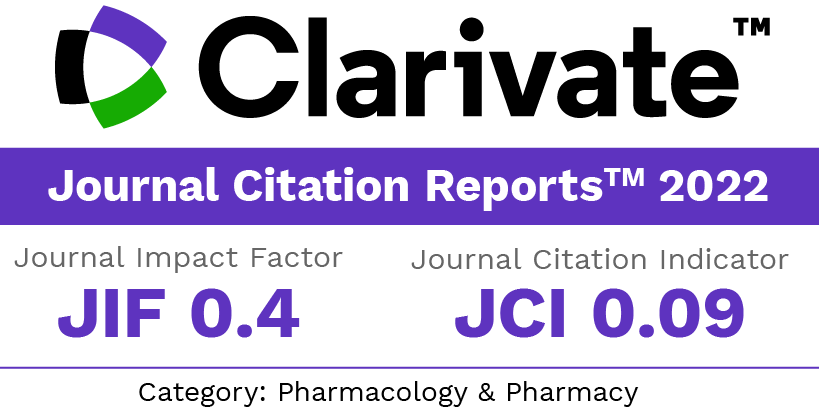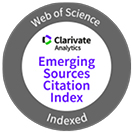Differentially expressed genes in small cell lung cancer: Potential therapeutic targets
DOI:
https://doi.org/10.30827/ars.v65i3.30072Keywords:
Small Cell Lung Carcinoma, Gene Expression Profiling, Therapeutic targetAbstract
Introduction: Small cell lung cancer (SCLC) is characterized by a discouraging life expectancy and limited treatment options, so the urgency to find new therapeutic targets is considerable. In this context, the use of differential gene expression analyses in SCLC tumor cells has made it possible to identify abnormally expressed genes associated with the development and progression of the disease, which may contribute to the discovery of potential therapeutic targets.
Method: A literature review was carried out in the databases PubMed, Science Direct, Google Scholar and Wiley, after which 28 references were included.
Results: Literature analysis revealed 37 differentially expressed genes in SCLC, involved in critical biological functions such as cell cycle regulation, signaling, transcription and embryonic development. Abnormal expression of these genes is associated with serious clinical consequences, such as poor prognosis, cancer progression, and drug resistance, highlighting the potential of these genes as potential therapeutic targets.
Conclusion: Detailed understanding of differential gene expression in SCLC opens promising ways for development of targeted therapies and the identification of these abnormally expressed genes as potential therapeutic targets represents a promising approach in the fight against this lethal form of lung cancer.
Downloads
References
Bray F, Ferlay J, Soerjomataram I, et al. Global cancer statistics 2018: GLOBOCAN estimates of incidence and mortality worldwide for 36 cancers in 185 countries. CA Cancer J Clin. 2018; 68(6):394-424. Doi:10.3322/caac.21492 DOI: https://doi.org/10.3322/caac.21492
Bernabé-Caro R, Chen Y, Dowlati A, & Eason P. Current and Emerging Treatment Options for Patients With Relapsed Small-cell Lung Carcinoma: A Systematic Literature Review. Clin lung cancer. 2023; 24(3), 185–208. Doi: 10.1016/j.cllc.2023.01.012 DOI: https://doi.org/10.1016/j.cllc.2023.01.012
Stewart C, Gay C, Xi Y, Sivajothi S, Sivakamasundari V, Fujimoto J, et al. Single-cell analyses reveal increased intratumoral heterogeneity after the onset of therapy resistance in small-cell lung cancer. Nature cancer. (2020); 1, 423–436. Doi:10.1038/s43018-019-0020-z DOI: https://doi.org/10.1038/s43018-019-0020-z
McGranahan N, Swanton C. Clonal heterogeneity and tumor evolution: past, present, and the future. Cell. 2017; 168(4):613-628. Doi:10.1016/j.cell.2017.01.018 DOI: https://doi.org/10.1016/j.cell.2017.01.018
Shlyakhtina Y, Moran K, & Portal M. Genetic and Non-Genetic Mechanisms Underlying Cancer Evolution. Cancers. 2021; 13(6), 1380. Doi:10.3390/cancers13061380 DOI: https://doi.org/10.3390/cancers13061380
Luo H, Shan J, Zhang H, Song G, Li Q, & Xu C. Targeting the epigenetic processes to enhance antitumor immunity in small cell lung cancer. Semin cancer biol, (2022); 86(3): 960–970. Doi:10.1016/j.semcancer.2022.02.018 DOI: https://doi.org/10.1016/j.semcancer.2022.02.018
Xue J, Liu Y, Wan L, Zhu Y. Comprehensive Analysis of Differential Gene Expression to Identify Common Gene Signatures in Multiple Cancers. Med Sci Monit. 2020; 26:e919953. Doi:10.12659/MSM.919953. DOI: https://doi.org/10.12659/MSM.919953
Krzyszczyk P, Acevedo A, Davidoff E, Timmins L, Marrero-Berrios I, Patel M, White C, Lowe C, Sherba J, Hartmanshenn C, et al. The growing role of precision and personalized medicine for cancer treatment. Technology. 2019; 6:79–100. Doi:10.1142/S2339547818300020 DOI: https://doi.org/10.1142/S2339547818300020
Mao Y, Xue P, Li L, Xu P, Cai Y, Chu X, Jiang P, & Zhu S. Bioinformatics analysis of mRNA and miRNA microarray to identify the key miRNA‑gene pairs in small‑cell lung cancer. Mol med rep. 2019; 20(3), 2199–2208. Doi:10.3892/mmr.2019.10441 DOI: https://doi.org/10.3892/mmr.2019.10441
Ni Z, Wang X, Zhang T, Li L, & Li J. Comprehensive analysis of differential expression profiles reveals potential biomarkers associated with the cell cycle and regulated by p53 in human small cell lung cancer. Exp ther med. 2018; 15(4), 3273–3282. Doi:10.3892/etm.2018.5833 DOI: https://doi.org/10.3892/etm.2018.5833
Shia D, Choi W, Vijayaraj P, Vuong V, Sandlin J, Lu M, et al. Targeting PEA3 transcription factors to mitigate small cell lung cancer progression. Oncogene. 2023; 42(6), 434–448. Doi:10.1038/s41388-022-02558-6 DOI: https://doi.org/10.1038/s41388-022-02558-6
Deng F, Tao F, Xu Z, Zhou J, Gong X, Zhang R. Construction of Prognostic Risk Model for Small Cell Lung Cancer Based on Immune-Related Genes. Comp math methods med. 2022; 2022, 7116080. Doi:10.1155/2022/7116080 DOI: https://doi.org/10.1155/2022/7116080
Kaemmerer D, Reimann C, Specht E, Wirtz RM, Sayeg M, Baum RP, Schulz S, Lupp A. Differential expression and prognostic value of the chemokine receptor CXCR4 in bronchopulmonary neuroendocrine neoplasms. Oncotarget. 2015; 6(5), 3346–3358. Doi:10.18632/oncotarget.3242 DOI: https://doi.org/10.18632/oncotarget.3242
Tang Y, Li G, Li D, Tang D, Huang J, Feng H, et al. The clinical significance of integrin subunit alpha V in cancers: from small cell lung carcinoma to pan-cancer. BMC pulm med. 2022; 22(1), 300. Doi:10.1186/s12890-022-02095-8 DOI: https://doi.org/10.1186/s12890-022-02095-8
Li G, Chen G, Liu J, Tang D, Zheng J, Luo J, et al. Clinical significance of cyclin-dependent kinase inhibitor 2C expression in cancers: from small cell lung carcinoma to pan-cancers. BMC pulm med. 2022; 22(1), 246. Doi:10.1186/s12890-022-02036-5 DOI: https://doi.org/10.1186/s12890-022-02036-5
Kerkentzes K, Lagani V, Tsamardinos I, Vyberg M, Røe OD. Hidden treasures in “ancient” microarrays: gene-expression portrays biology and potential resistance pathways of major lung cancer subtypes and normal tissue. Front oncol. 2014; 4, 251. Doi:10.3389/fonc.2014.00251 DOI: https://doi.org/10.3389/fonc.2014.00251
Yang L, Hu H, Deng Y, Bai Y. Zhongguo fei ai za zhi = Chin J lung cancer. 2014; 17(11), 769–777. Doi:10.3779/j.issn.1009-3419.2014.11.01
Westerman B, Breuer R, Poutsma A, Chhatta A, Noorduyn L, Koolen M, et al. Basic helix-loop-helix transcription factor profiling of lung tumors shows aberrant expression of the proneural gene atonal homolog 1 (ATOH1, HATH1, MATH1) in neuroendocrine tumors. Int J Biol Markers. 2007; 22(2), 114–123. Doi:10.1177/172460080702200205 DOI: https://doi.org/10.5301/JBM.2008.4847
Lang C, Lantos A, Megyesfalvi Z, Egger F, Hoda M, Mosleh B, et al. Clinical and prognostic implications of CD47 and PD-L1 expression in surgically resected small-cell lung cancer. ESMO open. 2022; 7(6), 100631. Doi:10.1016/j.esmoop.2022.100631 DOI: https://doi.org/10.1016/j.esmoop.2022.100631
Tenjin Y, Matsuura K, Kudoh S et al. Distinct transcriptional programs of SOX2 in different types of small cell lung cancers. Lab Invest. 2020; 100, 1575–1588. Doi:10.1038/s41374-020-00479-0 DOI: https://doi.org/10.1038/s41374-020-00479-0
Cui F, Hao Z, Li J, Zhang Y, Li X, He J. SOX2 mediates cisplatin resistance in small-cell lung cancer with downregulated expression of hsa-miR-340-5p. Mol genet genomic med. 2020; 8(5), e1195. Doi:10.1002/mgg3.1195 DOI: https://doi.org/10.1002/mgg3.1195
Jotatsu T, Yagishita S, Tajima K, Takahashi F, Mogushi K, Hidayat M, et al. LSD1/KDM1 isoform LSD1+8a contributes to neural differentiation in small cell lung cancer. Biochem biophys rep. 2016; 9, 86–94. Doi:10.1016/j.bbrep.2016.11.015 DOI: https://doi.org/10.1016/j.bbrep.2016.11.015
Mohammad H, Smitheman K, Kamat C, Soong D, Federowicz K, Van Aller G, et al. A DNA Hypomethylation Signature Predicts Antitumor Activity of LSD1 Inhibitors in SCLC. Cancer cell. 2015; 28(1), 57–69. Doi:10.1016/j.ccell.2015.06.002 DOI: https://doi.org/10.1016/j.ccell.2015.06.002
Nguyen E, Taniguchi H, Chan J, Zhan Y, Chen X, Qiu J, et al. Targeting Lysine-Specific Demethylase 1 Rescues Major Histocompatibility Complex Class I Antigen Presentation and Overcomes Programmed Death-Ligand 1 Blockade Resistance in SCLC. J thorac oncol. 2022; 17(8), 1014–1031. Doi:/10.1016/j.jtho.2022.05.014 DOI: https://doi.org/10.1016/j.jtho.2022.05.014
Shen W, Luo P, Sun Y, Zhang W, Zhou N, Zhan H, et al. NRBF2 regulates the chemoresistance of small cell lung cancer by interacting with the P62 protein in the autophagy process. iScience. 2022; 25(6), 104471. Doi:10.1016/j.isci.2022.104471 DOI: https://doi.org/10.1016/j.isci.2022.104471
Schultheis A, Bos M, Schmitz K, Wilsberg L, Binot E, Wolf J, et al. Fibroblast growth factor receptor 1 (FGFR1) amplification is a potential therapeutic target in small-cell lung cancer. Mod pathol. 2014; 27(2), 214–221. Doi:10.1038/modpathol.2013.141 DOI: https://doi.org/10.1038/modpathol.2013.141
Zhang J, Zhang H, Zhang L, Li D, Qi M, Zhang L, et al. Single-Cell Transcriptome Identifies Drug-Resistance Signature and Immunosuppressive Microenvironment in Metastatic Small Cell Lung Cancer. Adv gen. 2022; 3(2), 2270021. Doi:10.1002/ggn2.202270021 DOI: https://doi.org/10.1002/ggn2.202100060
He T, Wildey G, McColl K, Savadelis A, Spainhower K, McColl C, et al. Identification of RUNX1T1 as a potential epigenetic modifier in small-cell lung cancer. Mol oncol. 2021; 15(1), 195–209. Doi:10.1002/1878-0261.12829 DOI: https://doi.org/10.1002/1878-0261.12829
Yan W, Chung C, Xie T, Ozeck M, Nichols T, Frey J, et al. Intrinsic and acquired drug resistance to LSD1 inhibitors in small cell lung cancer occurs through a TEAD4-driven transcriptional state. Mol oncol. 2022; 16(6), 1309–1328. Doi:10.1002/1878-0261.13124 DOI: https://doi.org/10.1002/1878-0261.13124
Wang H, Wu S, Li Z, Zhang C, Shang X, Zhao C, et al. Molecular subtyping of small-cell lung cancer based on mutational signatures with different genomic features and therapeutic strategies. Cancer sci. 2023; 114(2), 665–679. Doi10.1111/cas.15606 DOI: https://doi.org/10.1111/cas.15606
Hu C, Dong J, Liu L, Liu J, Sun X, Teng F, et al. ASCL1 and DLL3 expressions and their clinicopathological implications in surgically resected pure small cell lung cancer: A study of 247 cases from the National Cancer Center of China. Thorac cancer. 2022; 13(3), 338–345. Doi:10.1111/1759-7714.14249 DOI: https://doi.org/10.1111/1759-7714.14249
Shukla V, Rao M, Zhang H, Beers J, Wangsa D, Buishand F, et al. ASXL3 is a novel pluripotency factor in human respiratory epithelial cells and a potential therapeutic target in small cell lung cancer. Cancer res. 2017; 77(22), 6267–6281. Doi:10.1158/0008-5472.CAN-17-0570 DOI: https://doi.org/10.1158/0008-5472.CAN-17-0570
Quintanal-Villalonga A, Taniguchi H, Hao Y, Chow A, Zhan Y, Chavan S, Uddin F, et al. Inhibition of XPO1 sensitizes small cell lung cancer to first- and second-line chemotherapy. Cancer res. 2022; 82(3), 472–483. Doi:10.1158/0008-5472.CAN-21-2964 DOI: https://doi.org/10.1158/0008-5472.CAN-21-2964
Quintanal-Villalonga A, Durani V, Sabet A, Redin E, Kawasaki K, Shafer M, et al. Exportin 1 inhibition prevents neuroendocrine transformation through SOX2 down-regulation in lung and prostate cancers. Sci transl med. 2023; 15(707), eadf7006. Doi:10.1126/scitranslmed.adf7006 DOI: https://doi.org/10.1126/scitranslmed.adf7006
Peng J, Wang Q, Liu H, Ye M, Wu X, Guo L. EPHA3 regulates the multidrug resistance of small cell lung cancer via the PI3K/BMX/STAT3 signaling pathway. Tumour biol. 2016; 37(9), 11959–11971. Doi:10.1007/s13277-016-5048-4 DOI: https://doi.org/10.1007/s13277-016-5048-4
Kim K, Kim Y, Rivard C, Kim D, Park K. FGFR1 is critical for RBL2 loss-driven tumor development and requires PLCG1 activation for continued growth of small cell lung cancer. Cancer res. 2020; 80(22), 5051–5062. Doi:10.1158/0008-5472.CAN-20-1453 DOI: https://doi.org/10.1158/0008-5472.CAN-20-1453
Taniwaki M, Daigo Y, Ishikawa N, Takano A, Tsunoda T, Yasui W, et al. Gene expression profiles of small-cell lung cancers: molecular signatures of lung cancer. Int. J. Oncol. 2006; 29(3), 567–575. https://doi.org/10.3892/ijo.29.3.567 DOI: https://doi.org/10.3892/ijo.29.3.567
Rudin C, Poirier J, Byers L, Dive C, Dowlati A, George J, et al. Molecular subtypes of small cell lung cancer: a synthesis of human and mouse model data. Nature reviews. Cancer 2019; 19(5), 289–297. Doi:10.1038/s41568-019-0133-9 DOI: https://doi.org/10.1038/s41568-019-0133-9
Downloads
Published
How to Cite
Issue
Section
License
Copyright (c) 2024 Luis Esteban Jiménez Sánchez

This work is licensed under a Creative Commons Attribution-NonCommercial-ShareAlike 4.0 International License.
The articles, which are published in this journal, are subject to the following terms in relation to the rights of patrimonial or exploitation:
- The authors will keep their copyright and guarantee to the journal the right of first publication of their work, which will be distributed with a Creative Commons BY-NC-SA 4.0 license that allows third parties to reuse the work whenever its author, quote the original source and do not make commercial use of it.
b. The authors may adopt other non-exclusive licensing agreements for the distribution of the published version of the work (e.g., deposit it in an institutional telematic file or publish it in a monographic volume) provided that the original source of its publication is indicated.
c. Authors are allowed and advised to disseminate their work through the Internet (e.g. in institutional repositories or on their website) before and during the submission process, which can produce interesting exchanges and increase citations of the published work. (See The effect of open access).























